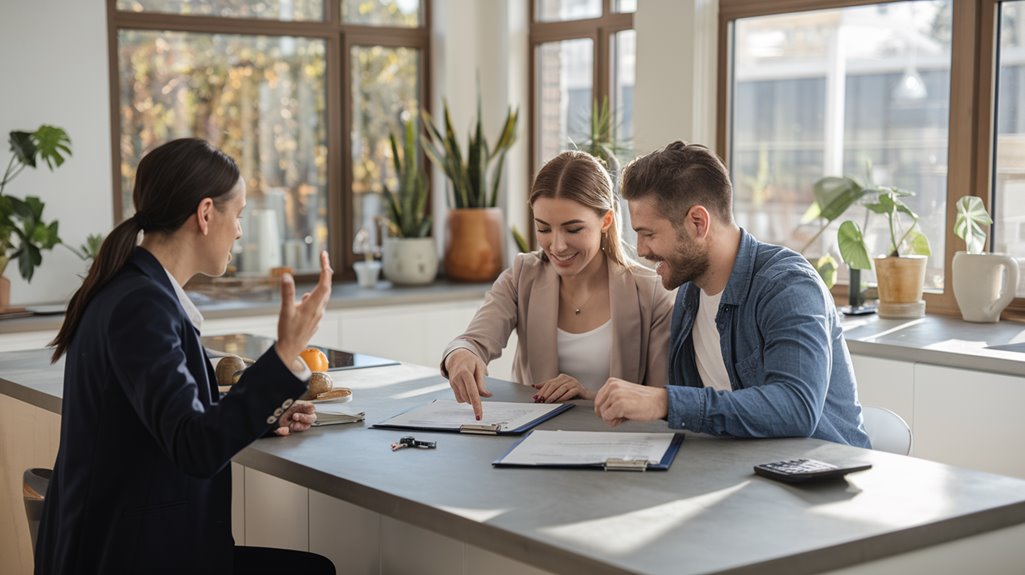Buying a home costs more than just the price tag. You need to think about closing costs too! These extra fees add up to $2-5 for every $100 you borrow.
While you save money for your down payment, remember you'll need extra cash for things like:
- Papers that show you own the house
- People who check the house's worth
- Banks that handle your loan
The bank will charge you $5-10 for every $1,000 you borrow. You also need to pay about $300-500 just to ask for the loan.
Make sure you save enough money to cover both these costs and keep some extra money for later. The more you know about these fees, the better deals you can get.
Don't let these costs catch you by surprise. Plan ahead so you can buy your dream home without money worries!
Ready to start building equity in your own Michigan home? Get your personalized home loan quote today.
Understanding Closing Costs
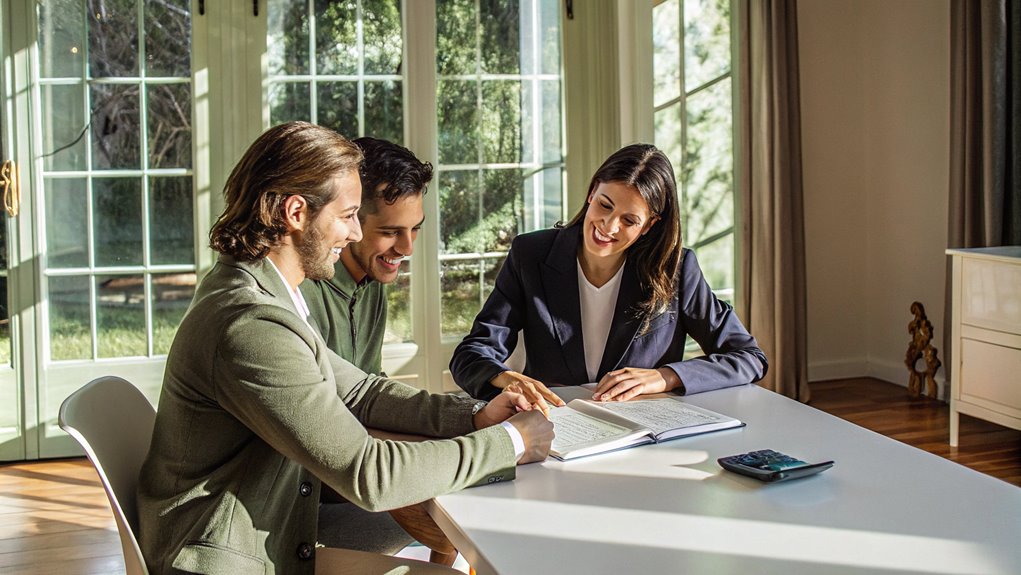
When you buy a home, you need to pay extra money at the end. These are called closing costs. Think of them like fees you pay to finish buying your house.
You might need to pay between $2 to $5 for every $100 you borrow. Some of this money goes to the bank that gives you your home loan. Some goes to other people who help with your home purchase.
The bank will charge you to look at your loan papers and set up your loan. Other people will check how much your house is worth, make sure no one else owns it, and write down that you bought it.
You need to save up for these costs just like you save for your down payment. The bank will tell you how much these costs are within three days after you ask for your loan.
Michigan residents, unlock the door to your new home. Request your home loan quote from Treeside Financial today.
Common Types of Fees
You need to know about fees when buying a home.
Let me tell you about the big ones. You pay for title insurance to make sure no one else can claim your home. Your bank will charge you a fee to handle your loan papers.
You also need to pay someone to check how much your home is worth. This check costs between $300 and $600, and your bank needs it before they give you the loan.
Title Insurance Fees
When you buy a house, you need title insurance to protect your new home. Think of it like a safety net that helps if someone else claims they own your house or if there are problems with the paperwork.
You need two kinds of title insurance. The first one is for your bank – you must get this one. The second one is for you – this one is your choice, but it keeps you safe.
You might be closer to buying your home than you think
Take our 2-minute home buyer readiness quiz to see how prepared you really are – no credit check required.

Title insurance helps if someone lies about papers, if missing family members claim the house is theirs, or if there are money problems tied to the house that no one knew about.
You only pay for title insurance once when you buy your house. It keeps working for you and your family as long as you own the home.
The cost changes based on where you live and how much your house costs. Most people pay about $5 to $10 for every $1,000 their house is worth.
You can save money if you buy both types of insurance at the same time. Many insurance companies will give you a lower price when you do this.
Lender Origination Charges
Getting a home loan comes with fees. Your lender needs money to help process your loan. These fees are called origination charges.
Most lenders ask for a small part of your total loan amount – about $5 to $10 for every $1,000 you borrow. This money pays for people to check your papers and set up your loan.
When you get your loan papers, you'll see a list of these costs. Some lenders put all the fees in one big sum. Others show each fee by itself.
Want to save money? Talk to different lenders. Ask them what their fees are. You can even ask them to lower their fees, just like at a yard sale.
Make sure you know what each fee is for – you have the right to ask!
Remember to look at all the fees when picking a lender, not just one. This helps you find the best deal for your money.
Property Appraisal Costs
Getting your home's value checked is a key step when buying a house. You need to pay someone called an appraiser to look at the house. This costs about $300 to $600. The price changes based on where you live and how big the house is.
The appraiser walks through the house to check how nice it is. They look at things like how many rooms it has and if anything needs to be fixed. They also look at what other homes in your area sold for. This helps them pick the right price for your house.
Remember that this isn't the same as a home check-up. The appraiser just tells you what the house is worth so you and the bank know it's a fair price.
Calculating Your Expected Costs
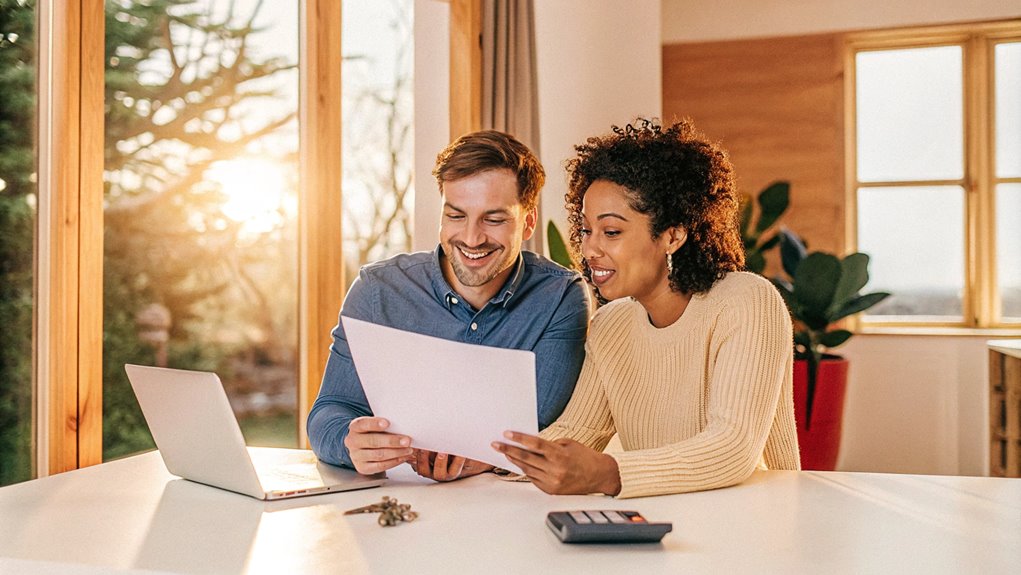
You need to know how much money to save for buying your home. There are two kinds of costs to think about:
First, you have loan costs. These are fees you pay to get your home loan. They include:
- What the bank charges to make your loan
- What you pay someone to check your home's worth
- What you pay to look at your credit score
Second, you have tax costs. These are fees you pay to the government. They include:
- Tax when you buy the home
- Tax on the house that you pay ahead of time
- Tax for writing down that you own the home
If you list these costs now, you can better plan how much money you need. You can also talk to banks about some fees, but you must pay all government fees.
Essential Cost Categories
When you buy a home, you need to pay for many important things. These costs help make sure everything is done right.
You start by paying fees to check if you can get a loan. The bank will look at your credit and ask you to fill out forms.
Next, you need to pay people to look at the house. They check if the house is worth the money and make sure it's in good shape. You also need to pay for papers that show you own the house.
The city or state wants money too. They charge fees to record that you bought the house. How much you pay depends on where you live.
You must also pay some bills ahead of time. These include house insurance and property taxes. The bank keeps this money safe in a special account.
Last, you pay other people who help with the sale. This includes lawyers and people who check for bugs in the house.
All these costs make sure your new home is truly yours.
Loan Fees Vs Taxes
Buying a home comes with two big costs: loan fees and taxes. Let's break them down so they're easy to understand.
Loan fees are what you pay the bank to get your money. Taxes are what you pay your city or town.
Here's what you can expect to pay:
| Cost Type | Typical Range |
|---|---|
| Origination Fee | 0.5-1% of loan |
| Property Tax | 1-3% annually |
| Transfer Tax | 0.1-2% of sale |
| Recording Fee | $125-250 |
| Title Insurance | 0.5-1% of loan |
Every city has different costs. You can talk to your bank about lower loan fees. But taxes stay the same – you can't change them.
The good news is that knowing these costs helps you save up the right amount of money. You can plan ahead and know just what to expect when you buy your home.
Negotiating With Sellers
Want to save money when buying a home? Ask the seller to help pay for closing costs. This can save you lots of money up front. Put this ask in your first offer to the seller. Tell them just how much help you need.
Many sellers will help out, mostly when there are more homes for sale than buyers. Your bank will set rules for how much help you can get from the seller. They often let sellers pay 3% to 9% of the home price.
Think about this plan with care. Some sellers might say yes, but ask for more money for the house.
Talk to your real estate agent about what works best for your money plan.
Lender Requirements
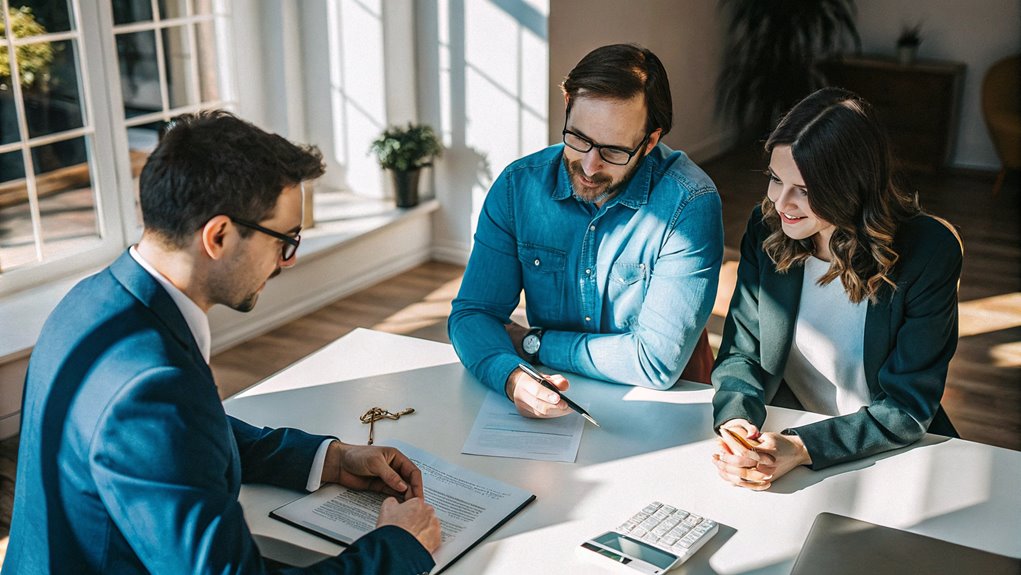
Getting ready to buy a home means you need two types of money. First, you need money for your down payment.
Second, you need extra money in your bank account that your lender wants to see.
You also need to pay fees to the lender. These fees help them check your credit and do paperwork. The fees often cost between 1-3% of your home loan.
Last, you must get home insurance. Your lender needs you to have enough insurance to protect your new home.
This keeps both you and the lender safe if something bad happens to the house.
Down Payment Vs Reserves
When you buy a house, you need two different piles of money.
First, you need money to pay right away – this is your down payment. Think of it like paying part of the house price up front. Most people pay between $3.50 and $20 for every $100 of the house price.
The other pile of money is like a safety net. This money stays in your bank after you buy the house. It helps you pay your bills if you stop getting a paycheck for a while. Your bank wants to see you have enough saved to pay bills for two to six months.
You must show the bank both piles of money. You can't use the same dollars for both things. The bank will check to make sure you have enough saved for each one.
Processing Fee Breakdowns
Getting a home loan means paying fees to your lender. These fees help cover the work needed to check and approve your loan.
Think of these fees like buying a ticket to see a movie. You pay not just for the movie, but also for the people who work there.
Here are the main fees you might see:
- A fee to apply ($300-$500)
- A fee to check if you can pay back the loan ($400-$900)
- A fee to look at your credit score ($30-$50)
- A fee to lock in your rate ($350-$750)
When you pick a lender, look at more than just the rate they offer. Ask them to list all their fees. Some lenders put all fees into one big fee. Others show each fee by itself.
You can ask if any fees can be lower, or check with other lenders to find better prices.
Required Insurance Coverage
When you buy a home with a mortgage, you need insurance. Your lender wants to protect the money they give you. You must pay for insurance before you can close on your home.
You need these types of insurance:
- Home insurance – keeps your house safe from damage and theft
- PMI – you need this if you pay less than 20% for your down payment
- Flood insurance – you need this if your house is in an area that floods
You must get all these types of insurance. Your lender won't give you money without them. Know how much they cost so you can be ready when you buy your home.
The bank will want you to pay for one year of insurance up front.
They'll also set up a special account to pay for future insurance costs.
Down Payment Vs Closing Costs
Buying a house means paying two big things up front: a down payment and closing costs.
The down payment is the money you give first to buy your house. Think of it as your first big share of the house payment. You might need to pay 3.5% to 20% of what the house costs. When you pay more at the start, you pay less each month later.
Closing costs are different. These are fees you pay to get your house keys. You pay people who help make sure everything about buying the house is done right. This includes people who check the house value and make sure no one else owns it.
You usually pay 2% to 5% of your loan for these costs. This money doesn't help you own more of your house – it just pays for all the work needed to make the house yours.
Regional Cost Variations
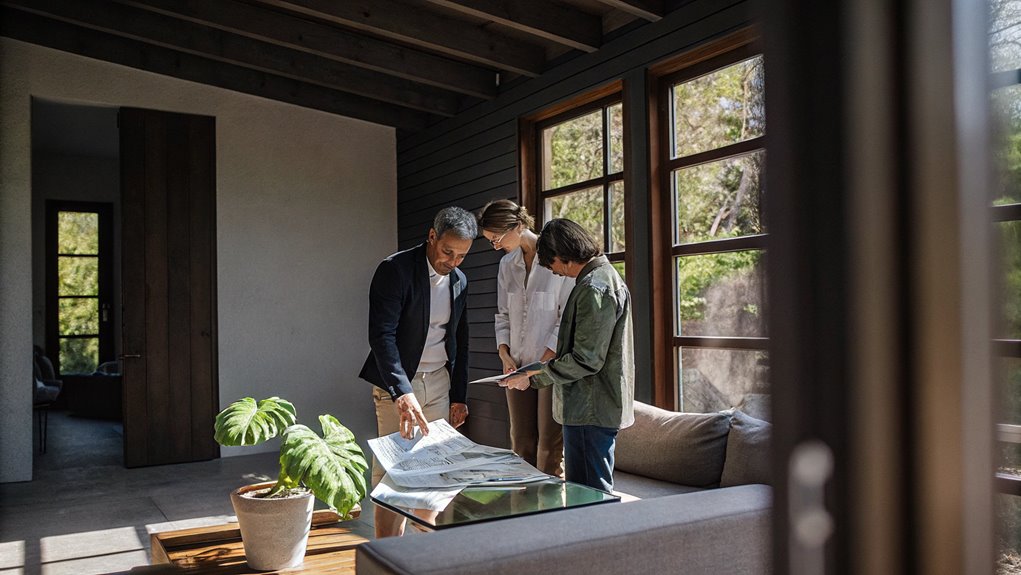
When you buy a home, what you pay at the end can be very different based on where you live. Just like food costs more in some places, closing costs on homes can cost more or less too.
The money you pay depends on three big things:
- Your state's rules and taxes
- The cost to check who owns the home
- The fee you pay to move the home into your name
Some states make you pay a lot. New York is one of them. Other states like Missouri ask for less money.
Before you buy a home, look up what people in your area usually pay. Don't just trust the normal prices you see for the whole country. Your city or state might be very different.
The best way to know what you'll pay is to ask people who sell homes in your area. They deal with these costs every day and can tell you what to expect.
Saving Strategies
Saving for your new home takes a bit of work, but you can do it! First, pick out how much house you want to buy. Then save about 3-6% more for closing costs. The best way is to have your bank move money each month into a special savings account.
You can save more money faster if you cut back on things you buy each month. When you get extra money, like from tax time or work bonus, put it in your savings.
Stop paying for things you don't really need right now. If you want to buy a house soon, keep your money in the bank where you can get to it fast.
Some banks let you add closing costs to your home loan. But remember – this means you'll pay more each month.
Hidden Expenses to Consider
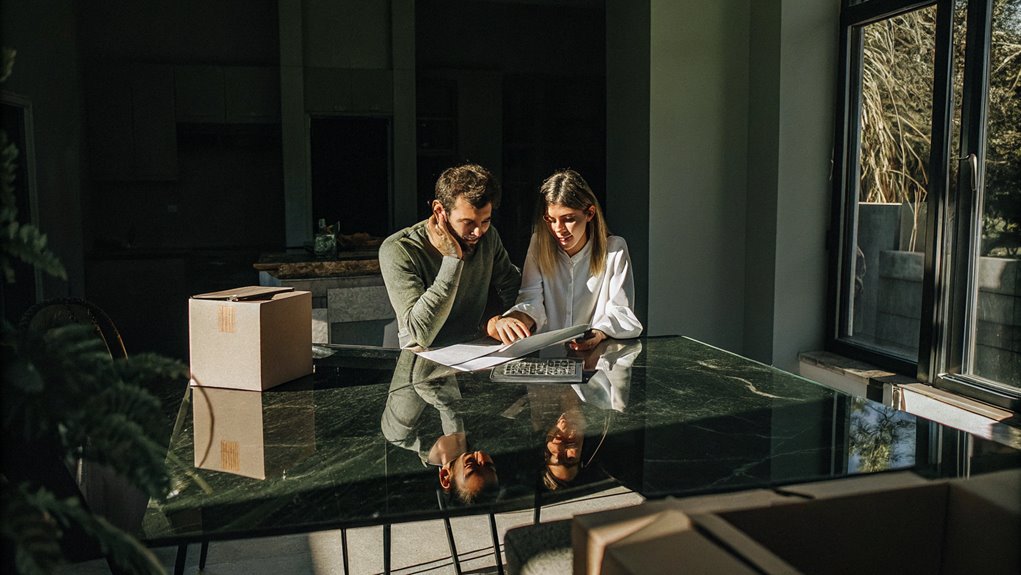
Buying a home costs more than just the down payment. Many people miss small costs that add up fast.
Let's look at costs you mightn't think about:
Extra Home Checks
- Special tests for things like radon or mold
- Finding problems in walls or floors
- Looking for bugs or pests
Getting Services Ready
- Turning on power and water
- Paying deposits for gas and trash pickup
- First month bills before you move in
Moving Day Costs
- Paying people to move your stuff
- Buying boxes and tape
- Paying rent and mortgage at the same time
- Storing things until you move in
Plan for these costs before you buy. This way, you won't have money problems when you get your new home.
Timing Your Home Purchase
When to Buy Your Home
Want to save money on your new home? The time of year you buy makes a big difference. Some months have better deals than others.
Winter is the best time to buy. Not many people look for homes then, so prices drop by 3-5%. You won't have to fight with other buyers for the same house.
Spring is busy. Many people want to buy homes, so prices stay high.
Summer stays busy too. You won't find many good deals.
Fall is a bit better. Prices can be 2-3% lower than spring or summer.
The day you close on your home matters too. If you close at the end of the month, you pay less in interest.
But if you close in the middle of the month, you have more time to fix any problems.
Available Assistance Programs
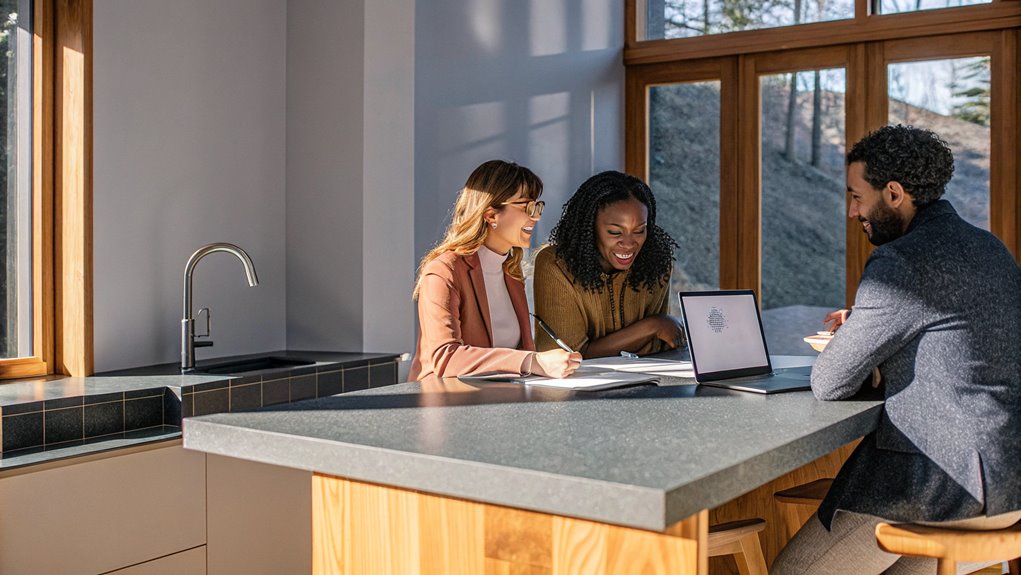
Buying your first home can feel scary, but help is out there! You might get money to pay for your home costs – and you don't have to pay it back.
The help comes from three main places:
- Your city
- Your state
- The U.S. government
They want to make it easier for you to buy a home. They give out:
- Free money
- Easy loans
- Tax breaks
These are the ways you can get help:
- FHA grants pay all your home costs if you don't make too much money
- State housing groups give loans you may not need to pay back
- Special help for homes in areas that need more buyers
You can use more than one type of help at once. Talk to:
- Your state's housing office
- A free housing helper
Many people can get this help. You might be able to get it too.

